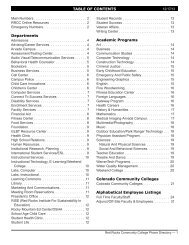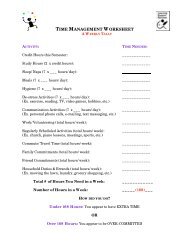opportunities, options, excellence - Red Rocks Community College
opportunities, options, excellence - Red Rocks Community College
opportunities, options, excellence - Red Rocks Community College
Create successful ePaper yourself
Turn your PDF publications into a flip-book with our unique Google optimized e-Paper software.
sonnel and how to operate an EOC during<br />
various situations. The course covers various<br />
aspects of information gathering and dissemination,<br />
along with best practices for use of<br />
computers in an EOC environment, promoting<br />
enhanced planning and better control<br />
information flow to safely and effectively<br />
make strategic response decisions.<br />
EMP 109 Incident Command<br />
Systems<br />
3 credits<br />
This course explores the dynamics of managing<br />
major emergency incidents. The National<br />
Incident Command System is used in the<br />
instruction. Major incidents where large life,<br />
property, or economic losses are possible are<br />
studied. Topics include organization and<br />
staffing, incident and event planning/staffing,<br />
organizing a response to an incident and incident<br />
resource management. Actual incidents<br />
are discussed and analyzed. This course recognizes<br />
that learning from the experience of<br />
others in handling major emergencies is<br />
required in the preplanning of emergencies in<br />
our own communities.<br />
EMP 240 Leadership and Influence<br />
3 credits<br />
This course enables students to lead and influence<br />
others in the demanding setting of emergency<br />
management by increasing their range<br />
of skills in a variety of interpersonal areas:<br />
conflict management, use of power group<br />
dynamics as well as leadership and influence.<br />
EMP 241 or EMP 247 Decision<br />
Making and Problem Solving or<br />
Decision Making in a Crisis<br />
3 credits<br />
These course are designed to enable students<br />
to clearly identify a problem and its causes in<br />
order to determine the appropriate type of<br />
decision making style. Using suggested methods<br />
of problem solving, participants will be<br />
able to apply creative solutions to both emergency<br />
and non-emergency situations.<br />
EMP 242 Effective Communications<br />
3 credits<br />
This course is designed to sharpen the presentation<br />
and media skills of emergency management<br />
officials when giving and receiving<br />
information in emergency management contexts.<br />
The course addresses not only public<br />
speaking, but also other areas of communication,<br />
such as one-on-one interactions, small<br />
group discussions, written communication,<br />
listening skills and dissemination of information.<br />
EMP 244 Developing Volunteer<br />
Resources<br />
3 credits<br />
This course is designed to enable students to<br />
develop and coordinate volunteer resources in<br />
a disaster. The success of developing volunteer<br />
resources is often critical in emergency<br />
management. Overall, local emergency program<br />
managers involve volunteers in different<br />
tasks and to varying degrees. Some rely<br />
almost exclusively on organized volunteer<br />
groups and make minimal use of individual<br />
volunteers. Yet both individual volunteers and<br />
established groups represent a wealth of talent<br />
that, systematically applied, can significantly<br />
upgrade the emergency management program.<br />
EMP 247 Decision Making in a<br />
Crisis<br />
3 credits<br />
Functioning in an emergency is not “business<br />
as usual”. The ability to make sound timely<br />
decisions during a crisis is critical. This<br />
course provides the opportunity to practice<br />
making decisions in much the same way as<br />
during an incident. It will enable the student<br />
to make emergency-related decisions, examine<br />
the consequences of those decisions on<br />
emergency operations and the community at<br />
large.<br />
EMP 291 Public Information Officer<br />
3 credits<br />
This course provides students an opportunity<br />
to practice and expand on public information<br />
skills in a crisis environment. The course is a<br />
highly interactive course that includes workshops<br />
on writing, public speaking, media<br />
interviews and awareness campaign development.<br />
Students also will discuss media relations<br />
and public information planning.<br />
EMS - EMERGENCY<br />
MEDICAL SERVICES<br />
EMS 100 CPR for the Health Care<br />
Provider<br />
1 credit<br />
This American Heart Association course is<br />
designed for individuals who are interested in<br />
entering the health care profession. This<br />
course teaches students how to prevent heart<br />
disease, adult CPR (one rescuer and two rescuer),<br />
adult obstructed airway (conscious and<br />
unconscious), child CPR, child obstructed airway<br />
(conscious and unconscious), infant CPR<br />
and infant obstructed airway (conscious and<br />
unconscious). Upon the completion of this<br />
course students will be certified in the<br />
American Heart Association Health Care<br />
Provider Course level of CPR.<br />
EMS 115 First Responder<br />
3 credits<br />
This course provides the student with core<br />
knowledge and skills to function in the capacity<br />
of a first responder arriving at the scene of<br />
an emergency and providing care until<br />
advanced EMS help arrives. Upon successful<br />
course completion, the student will be eligible<br />
to take a certification exam at the responder<br />
level.<br />
EMS 124 EMT - Basic Clinical<br />
3 credits<br />
Prerequisite: You must be 18 years old, have<br />
a valid driver’s license, high school diploma<br />
or GED certificate, recent (within 6 months)<br />
physical exam, initiaion of Hepatitis B vaccination<br />
series, recent (within 6 months) negative<br />
reading on the PPD (tuberculosis) skin<br />
test, updated MMR (measles, mumps, rubella)<br />
vaccination, current CPR card (Health Care<br />
Provider or Professional Rescuer level), proof<br />
of reading and writing at the twelfth grade<br />
level.<br />
Corequisite: EMS 125<br />
This course provides clinical experience for<br />
the EMT - Basic student.<br />
EMS 125 Emergency Medical<br />
Technician - Basic<br />
90 credits<br />
Prerequisite: Instructor permission required<br />
This course provides the first level of training<br />
in the career structure of the Emergency<br />
Medical Technician. Upon successful completion<br />
of this program (which includes written<br />
and practical examinations), candidates<br />
are eligible to take the state EMS certification<br />
examination (Candidates must fulfill the<br />
requirements set by the Colorado Department<br />
of Public Health and Environment)<br />
EMS 126 Emergency Medical<br />
Technician – Basic Refresher<br />
3 credits<br />
Prerequisite: Instructor permission required<br />
This course assists those needing to recertify<br />
their Colorado EMT-Basic license. Included<br />
in this class are the latest additions to the<br />
EMT-Basic curriculum. The course consists<br />
of lecture and skills sessions. At the end of<br />
the refresher course, a state approved practical<br />
exam will be offered. Upon completion, students<br />
will be prepared for the state written<br />
recertification exam.<br />
137 2002 - 2003 <strong>Red</strong> <strong>Rocks</strong> <strong>Community</strong> <strong>College</strong> Catalog
















